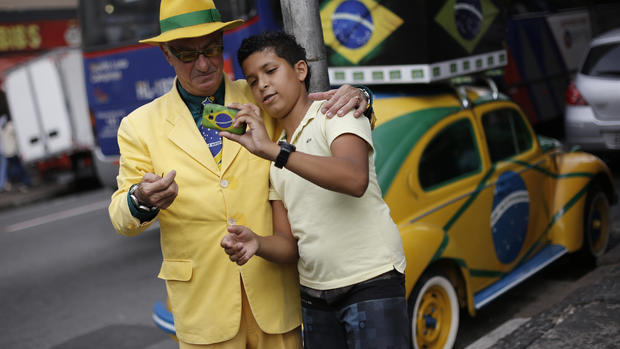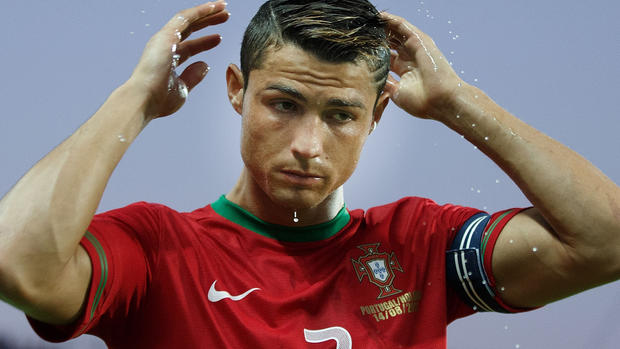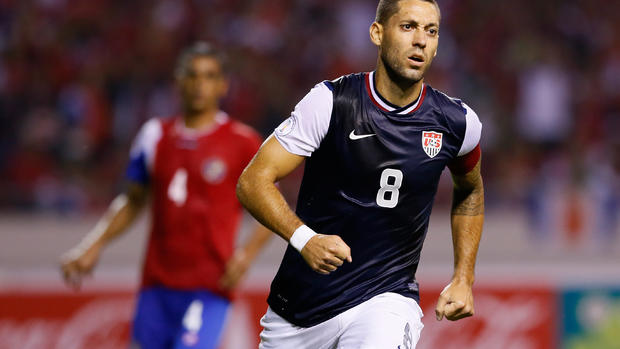World Cup 2014: Does Team USA stand a chance?
The United States Men's National Team has arguably the hardest road to World Cup success in Brazil of any of the 32 teams taking part in the tournament, despite being ranked 14th in the world by FIFA as of May 2014. It's just the luck of the draw at the world's biggest sporting event.
Head Coach Jurgen Klinsmann told the media last year after FIFA revealed the Americans' brutal path forward for the world's biggest sporting event: "It's a real challenge and we'll take it."
If the Americans hope to do anything in Brazil, it's precisely that moxie they'll require. Below is a breakdown of what they need to overcome.
TRAVEL DIFFICULTIES
The U.S. men have to travel farther once in Brazil to play their matches than any other team.
It's estimated the USMNT could log 11,500 miles from their base camp in Sao Paulo in a 10-day span just to play their games - which, by the way, will all take place in the sweltering tropics under the second-highest average temperature per city of any other team's schedule, including one game against Cristiano Ronaldo-led Portugal in a stadium in the middle of the Amazon jungle.
The all-time leading U.S. men's player in appearances for the national team, Cobi Jones, a three-time World Cup participant, told CBS News the travel situation was "unfortunate." However, Jones added he believed Klinsmann's vast international experience, as well as a little help from modern science with things like compression suits, will negate the travel schedule's difficulty.
While the distance may be hard, the negative affects of travel on athletic performance are largely linked to jet lag and the crossing of time zones. Brazil's games are being played in two simultaneous time zones, and the U.S. will only cross them once, again to play Portugal.
Finally, at least half the USMNT is likely to be made up of players from Major League Soccer, and they play coast-to-coast. Midfielder Sacha Kljestan, who didn't make the final cut for the World Cup squad but has 46 caps for the national team, told the Associated Press that American soccer players "are used to taking 3,000-mile trips across the country to play."
"GROUP OF DEATH"
Assuming the U.S. men overcome their brutal travel schedule with relative ease, they still have to show a decent level of success with three of the toughest teams in the tournament just to make it to the knockout stages.
Ghana
The USMNT travels from its home base in Sao Paulo about 1,330 miles to Estadio das Dunas in coastal Natal during the rainy season on June 16 to open the tournament against Ghana, who have knocked them out of the last two World Cups in a row.
Coach Klinsmann told the media earlier this year the match against Ghana is the Americans' "final."
"For us the schedule is a little bit different than for other teams that can maybe can work their way into the tournament...where they can say, 'Maybe we can take it one step at a time,'" Klinsmann said. "For us, we can't take it one step at a time. We've got to win the first game no matter what, right away."
Nearly every soccer pundit uses the same word when describing Ghana: "Athletic." It's precisely the Black Stars' superlative speed and strength that saw them fall just a Luis Suarez handball short of the semifinals in South Africa in 2010.
And while the 2014 edition of the Ghana squad has more questions this time around, they are still led by world-class striker Asamoah Gyan, and there is little doubt they can run circles around any team if given space, especially the Americans.
Jeff Agoos, the former USMNT defender with 134 caps and current MLS vice president for competition, told CBS News in an interview that Ghana should be "the sole focus" of the U.S. during their preparation, because they give the Americans their best opportunity to get a win in the group stage.
"They will leave chances, leave space open," Agoos said.
His former teammate Cobi Jones agreed in a separate interview, adding that their attacking style can be used against them.
"The U.S. could be defensive first, hopefully frustrate Ghana as the game goes on and pick their spots," Jones said.
The 2014 edition of the USMNT ought to be able to match Ghana's speed in at least a few places, especially with the energetic and fearless Michael Bradley holding down the midfield and Clint Dempsey running free just off the front line. Klinsmann's final 23-man roster also had the surprising inclusions of young speedsters like defenseman DeAndre Yedlin, and they could be headed to Brazil precisely to deal with Ghana.
Meanwhile, Ghana's defenders are fast, but attack-minded and generally undersized, which should leave plenty of opportunity for the big-bodied American striker Jozy Altidore to make plays in front of the goal.
Portugal
If the Americans' succeed against Ghana, they then run smack into the self-proclaimed rich, handsome, great player known as Cristiano Ronaldo (as well as his 10 very talented teammates). Portugal will face off against the USMNT in the Arena Amazonia in the sweltering jungle city of Manaus on June 22, a whopping 1,670 miles away from the Americans' base hotel.
The Portuguese were the last European team to sneak into the tournament thanks to four goals in a playoff game against Sweden from Ronaldo, who is currently the best player in the world by FIFA's estimation. While it didn't hurt that Lionel Messi was injured during much of the season when the voting for that title took place, Ronaldo is a true soccer force that should scare the britches off any defense: he's fast, strong, with great ball control, a rocket shot and a litany of scoring abilities capable of making goalies look dumb from just about any distance.
That said, it is possible to at least try to contain him. Cobi Jones said Ronaldo has certain repetitive tendencies that can be exploited.
"Ronaldo likes to drift in and drop out wide," Jones said. "Make sure he doesn't get on the ball as much as he'd like. You know he's going to get his opportunities, you want to limit his opportunities as much as you can."
Outside of Ronaldo, it's possible to debate Portugal's depth. Only Nani, Hugo Almeida, Helger Postiga and defenders Fabio Coentrao and Bruno Alves have had real success on the international stage. Add them to up-and-comers like MLS star defender Jose Goncalves and they still represent a formidable core group that should concern every team in the tournament.
The best weapon for the Americans may very well be Portugal's over-confidence, something Ronaldo indubitably possesses a lot of.
"Nobody thought we'd beat Portgual in 2002," Jeff Agoos said, harkening back to his participation in one of the most famous upsets in World Cup history, when the heavily favored Portuguese took the upstart Americans for granted in the group stage and were essentially knocked out of the tournament in a 3-2 loss.
USMNT star midfielder Michael Bradley told Sports Illustrated there's no way his team is making that mistake: "We're going to step on the field with respect for sure but the feeling we can really get after them."
Germany
Just four days after grappling with Cristiano Ronaldo and Co., the USMNT rolls into Arena Pernambuco in the oft-raining coastal city of Recife on June 26 to take on one of the teams some are picking to win this tournament, the Germans. Whether Coach Klinsmann, a former star player and coach for Germany himself, takes the team back to their base hotel 1,300 miles away in Sao Paulo before the match is not yet clear.
There are no weaknesses in this German team other than their relative youth. They scored the most goals during European qualifying. They are anchored in the middle by one of the world's best midfielders - Mesut Ozil - who has been compared to French soccer legend Zinadine Zidane, and reasonably so. Their defensive backs are all outstanding and they also may have the world's best goalkeeper right now in Manuel Neuer.
So what can the Americans do against Germany?
"I think there's a little bit of praying involved," Jeff Agoos told CBS News.
Cobi Jones said despite the considerable challenge Germany presents, there is reason to hope.
"This is a game where the U.S. has to look to successes of the past," Jones said.
The USMNT actually beat Germany 4-3 last year in a friendly at RFK Stadium in Washington, D.C., although the team the Germans brought to that match could politely be described as their "B squad," because few who played for Germany then will be in Brazil this summer.
Also, in the 2002 World Cup, the U.S. gave a heavily favored German team a tough match, falling 1-0 in the quarter-finals, and only after a controversial missed handball call.
It'll most likely come down to American moxie and strength if the USMNT wants to beat the Germans in this go around, although many would consider a draw a success.
"People forget the U.S. is a very physical team," Jones said. "They can run with the best of them and run teams into the ground."
Playing Style
Coach Klinsmann said when he took the helm in 2009 he wants the Americans to become both tougher and more aggressive on the soccer pitch, and his selection of a younger, faster, and more internationally experienced team to take to Brazil is plenty evidence of that.
The USMNT has begun to change the way it plays, moving forward more aggressively, not waiting for counter-strike opportunities and instead seeking to create chances on their own. Their captain, Clint Dempsey, is the true embodiment of that. He showed incredible creativity and aggression while on Fulham in the British Premier League, and has returned stateside to rack up remarkable goals and assists totals in the MLS.
Klinsmann has amassed a record as the Americans' coach of 26 wins, 7 draws and 10 losses as of May 26, 2014, including maintaining a winning record against opponents ranked in the top 10 worldwide, so it's safe to say he's been both right and successful so far, but the World Cup is the true test of any coach and team.
There is, however, a certain characteristic of American soccer players that might hold them back. Goalie Tim Howard touched on it during an interview with "60 Minutes Sports" for Showtime.
"When you look around the rest of the world, there are teams who will stamp their authority on the game, who will be in your face, who will kick you. There are other teams who in a very clever way will dive and roll around and get the referee on their side. And I think as Americans, we're just very honest," Howard said. "When it comes to soccer, we'll kick someone, then we'll help them up. Or we'll get kicked and our legs will fall off but we'll want to be tough and we'll jump up. And there's little moments where we could probably be more clever."
That sense of fairness might not extend to American domestic sports - think of NBA players gaming the refs, or NFL players going for someone's knees - but it is an inherent part American soccer. It could come from the insecurity of never being a soccer powerhouse, and therefore seeking respect.
"There's sportsmanship and there's gamesmanship. We have good sportsmanship. We don't want to cheat. We want to win fairly," Jeff Agoos told CBS News. "Gamesmanship is different -- think Maradonna and Italy. I think we want to win the right way."
Sometimes, however, being decent doesn't help even the most talented national teams win the World Cup.
History
At the inaugural World Cup in 1930 in Uruguay, the USMNT made the semifinals, ultimately finishing third. It's been all downhill since then, including a stretch from 1954 through 1986 where they didn't even qualify for a single tournament.
The sport's popularity has slowly risen in the U.S. since the 1970s when Pele plied his tried as a professional here for a brief time. That slow rise has culminated in the Americans fielding the most individually talented team of soccer players ever to enter the World Cup in U.S. jerseys.
For better or worse, no one expects them to do anything. Hardly any soccer pundits -- outside true-blue homers like Cobi Jones who picked a U.S.-Brazil final during an interview with CBS News -- have the Americans making it out of the group stage.
Thankfully, pundits are often wrong, and there's nothing to motivate a team to give its all like being an underdog - just ask the 2002 USMNT, who shocked the world when they rolled into the quarterfinals, and came close to doing more.
Another historical aid for the Americans is that this team has little history. Only five of the 23 players headed to Brazil have actually played in a World Cup before. The pressure of being perennial also-rans for Team USA in international soccer is simply not going to be there for most of them.
Finally, soccer is a lot like American football in that anything can happen in any game, and in the way the World Cup is structured, upsets are inevitable.
"The good thing about this sport is that it's hard for everybody," Jones said. "Nobody has got an easy route through."


